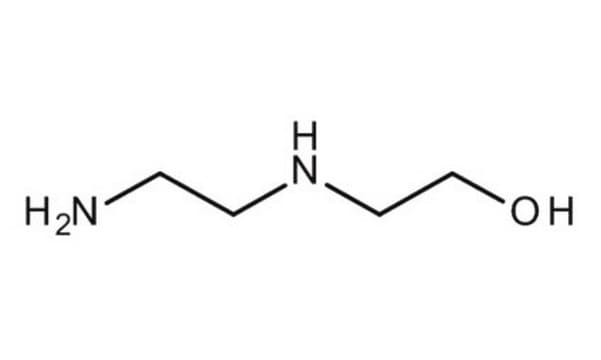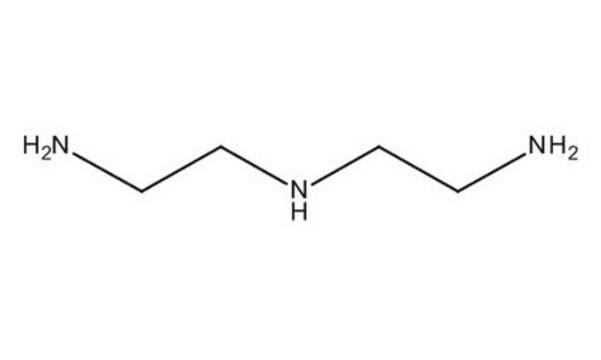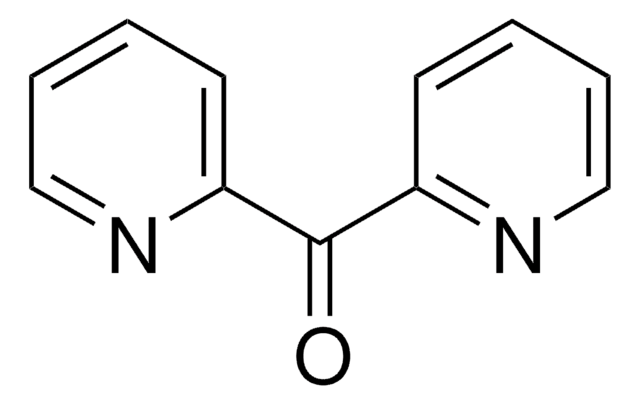8.01465
2-Amino-2-methyl-1-propanol
for synthesis
Synonym(s):
2-Amino-2-methyl-1-propanol, Isobutanolamine
About This Item
Recommended Products
vapor pressure
0.45 hPa ( 20 °C)
Quality Level
assay
93.0-98.0% (GC)
form
solid
autoignition temp.
438 °C
potency
2900 mg/kg LD50, oral (Rat)
>2000 mg/kg LD50, skin (Rabbit)
pH
11.3 (10 g/L in H2O)
bp
165 °C/1013 hPa (anhydrous)
mp
30-31 °C
transition temp
flash point 77.8 °C
density
0.95 g/cm3 at 25 °C
storage temp.
2-30°C
InChI
1S/C4H11NO/c1-4(2,5)3-6/h6H,3,5H2,1-2H3
InChI key
CBTVGIZVANVGBH-UHFFFAOYSA-N
Application
<li><strong>Buffering agent for membrane applications:</strong> 2-Amino-2-methyl-1-propanol is used in the preparation of PTMSP/PVTMS blend membranes, demonstrating its effectiveness as a buffering agent for enhancing the performance and stability of membrane contactor applications (Kalmykov et al., 2022).</li>
<li><strong>Sensing platform for environmental monitoring:</strong> 2-Amino-2-methyl-1-propanol is used in the development of a PVP/ZnO hydrogel integrated with quantum carbon dots, serving as an innovative sensing platform for hexavalent chromium detection in environmental monitoring (Truskewycz et al., 2020).</li>
<li><strong>Enhancement of CO<sub>2</sub> capture processes:</strong> 2-Amino-2-methyl-1-propanol is used in thei study of vapor-liquid equilibria data to derive crucial information that can optimize the energy performance of amine-based postcombustion CO<sub>2</sub> capture systems (Jiang et al., 2018).</li>
<li><strong>Conductive copper track formation on substrates: </strong>2-Amino-2-methyl-1-propanol is used in the plasma-induced decomposition of copper complex ink, which facilitated the formation of highly conductive copper tracks on heat-sensitive substrates, showing potential applications in electronic manufacturing (Farraj et al., 2017).</li>
</ul>
Analysis Note
Water (K. F.): ≤ 0.80 %
Identity (IR): passes test
Due to its specific melting range the product may be solid, liquid, a solidified melt or a supercooled melt.
signalword
Danger
hcodes
Hazard Classifications
Aquatic Chronic 3 - Eye Dam. 1 - Skin Irrit. 2
Storage Class
11 - Combustible Solids
wgk_germany
WGK 3
flash_point_f
172.0 °F
flash_point_c
77.8 °C
Certificates of Analysis (COA)
Search for Certificates of Analysis (COA) by entering the products Lot/Batch Number. Lot and Batch Numbers can be found on a product’s label following the words ‘Lot’ or ‘Batch’.
Already Own This Product?
Find documentation for the products that you have recently purchased in the Document Library.
Customers Also Viewed
Our team of scientists has experience in all areas of research including Life Science, Material Science, Chemical Synthesis, Chromatography, Analytical and many others.
Contact Technical Service













